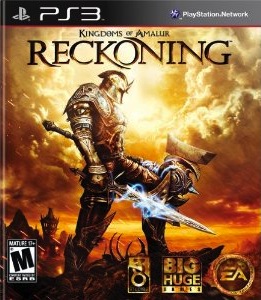The Sad Saga of 38 Studios
by ted2112, HSM team writer
Not only was Curt Schilling a Major League pitcher with three World Series Championships, but he’s also a gamer. So, when Schilling started thinking about retirement from baseball and what he wanted to do with the next chapter of his life, 38 Studios was born.
38 Studios started in a tiny office in Massachusetts, but like Schilling’s baseball career, it grew exponentially around two projects, developed simultaneously: Kingdoms of Amalur: Reckoning, and the massive on-line concept called Project Copernicus. Schilling wanted to create an over-the-top MMO, both in terms of scale and in quality, but a gaming company simply doesn’t form and release a blockbuster. So 38 studios had to learn the how of what it wanted to do first.
38 Studios gathered talent like Jon Laff of EA games, Travis McGeathy of Sony Online Entertainment and author R.A. Salvatore to create the mythos behind 38 Studios games. They released Kingdoms of Amalur: Reckoning in February 2012. This first 38 Studios title was well-received, both critically and by fans alike, and sold 1.2 million copies in the first ninety days alone.
 Kingdoms of Amalur: Reckoning was a role playing “hack and slash” title, and scored a 9 out 10 by IGN. Joystiq praised everything about the game, with a perfect 5 out of 5 score. This first step by 38 Studios was, on the surface, a winner — and more importantly showed that the fledgling company was capable of bigger and better things.
Kingdoms of Amalur: Reckoning was a role playing “hack and slash” title, and scored a 9 out 10 by IGN. Joystiq praised everything about the game, with a perfect 5 out of 5 score. This first step by 38 Studios was, on the surface, a winner — and more importantly showed that the fledgling company was capable of bigger and better things.
The one thing that Kingdoms of Amalur: Reckoning didn’t do, however, was net any profit. This seems to be the norm with gaming developers: it’s a risky business. Think of thatgamingcompany’s Flow and Flower; both were amazing titles, but didn’t net very much at all. In fact, it was only through the sales of books and T-shirts that thatgamecompany made any money with their third and blockbuster title Journey, in the first pivotal year of its release.
After the success of Kingdoms of Amalur: Reckoning, 38 studios turned its focus on Project Copernicus, but it needed cash. In what would become the most crucial move and ultimately the death sentence of the studio itself, the state of Rhode Island loaned seventy-five million dollars to fund the game with the stipulation that Schilling move the company to Rhode Island. In early 2011, 38 Studios moved to Providence, Rhode Island, and set to work on what would be one of the greatest MMOs never played.
The train wreck that followed has been reported many different ways, depending on who is doing the reporting, but the long and short of it centers around a late loan payment in May of 2012 and the Governor of Rhode Island, Lincoln Chafee, making very negative public comments about the loan just as the studio was gearing up for Project Copernicus and trying to raise further revenue. The negative  comments about the late payment and the loan itself made it virtually impossible for 38 Studios to raise any more money and started a domino effect that led to the closing of the studio, hundreds of layoffs, FBI involvement and the default on the loan from the state.
comments about the late payment and the loan itself made it virtually impossible for 38 Studios to raise any more money and started a domino effect that led to the closing of the studio, hundreds of layoffs, FBI involvement and the default on the loan from the state.
To put in perspective: the economic impact of the loan to the state — the seventy-five million — is a meager three months of income from the state’s casinos. In other words, this loan monetarily ranks up there with tolls from the Newport Bridge, and has more to do with politics than questionable loan practices. It’s a shame that a studio with a bright future ahead of it was cut down before it had a chance to even put out the product it was loaned money to make.
Only a handful of people have seen Project Copernicus in all its unfinished glory. One of those people happened to be Sony Online Entertainment’s President John Smedley, who described the game as gorgeous and went so far as to publicly say, “If that idiot Governor Chafee hadn’t trash talked right at the time Curt was trying to get funding you would be playing the game now.”
What Project Copernicus’ outcome would have been is unknown; however  it’s a safe bet that with the talent assembled at 38 Studios, the games would possibly have been enough to pay back loans and secure the video game’s company future.
it’s a safe bet that with the talent assembled at 38 Studios, the games would possibly have been enough to pay back loans and secure the video game’s company future.
In a time when game developers are dropping like flies, 38 Studios is just another cautionary tale of how risky the business is — and Project Copernicus may go down in gaming lore as the greatest MMO never released.
Share
| Tweet |



 Twitter
Twitter
You know the sad thing about this Ted?
Kingdoms of Amalur looked beyond promising for a sequel. It’s an excellent game that caught more of my attention than Skyrim and has a lot of replay value.
To read what happened, along with the background of the MMO, this is very sad indeed.
RIP, 38 Studios. You made a big fan out of me.